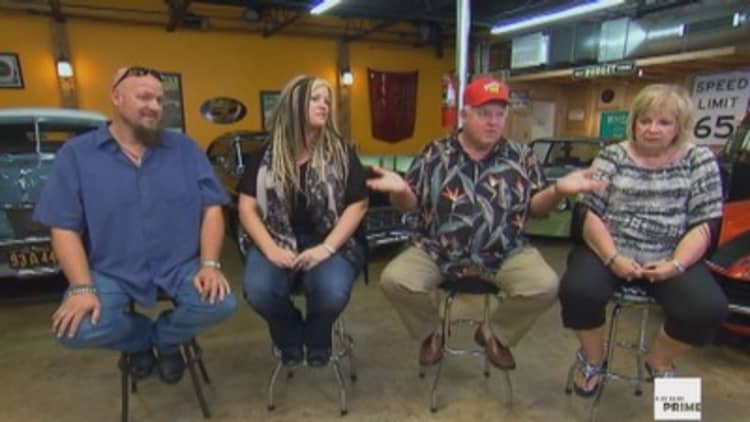
The moment of buying a vehicle can be thrilling, but when it comes to finalizing the title work, that joy can quickly numb if hit with a not-so-fun visit to the Department of Motor Vehicles (DMV). The sometimes-tedious trip is necessary to ensuring full ownership; yet not all new car owners follow through with it and run into problems when trying to sell their car, even finding they technically do not own it.
As the operations manager for Flat 12 Gallery, Meggan Bailey handles the paperwork for the countless sales her fiance Jeff Allen, the owner of the boutique car shop, makes. The pair, who both appear on CNBC's "The Car Chasers," find many issues arise after a deal has been cut due to the seller having unfinished or shoddy paperwork.
Make sure it’s in your name
One of the most obvious steps Bailey says people overlook after buying a car is officially putting its title in their name. This happens most often when people buy used vehicles or older ones they're looking to restore.
"So they get all this paperwork, they have their car and they think they're done. And then, they just throw all that paperwork off to the side until they want to sell the car and then usually, they don't figure out the problem until then. So now they have a buyer in front of them and they can't sell the car," Bailey said.
(Read more: Use a woman's touch to market and sell your car)
Even the fastest DMV around, according to Allen, could take up to 14 days to clear up such a problem. So it's best to finalize a vehicle's paperwork immediately after a purchase.
"Once you sign your name on the back, you need to take it down to whatever Department of Motor Vehicles is in your state," Allen said. "Pay the registration fees or pay the non-opp fee or pay the title-only fee and get yourself a title that's in your name."
Another issue they see often happens when a person has been driving a car for years that they received from a family member who then passes away. When the recipient of the car tries to sell it, he/she finds the title is still in the name of the deceased, and now must endure a much more tedious process to prove ownership than if he/she would've put the paperwork in his/her name immediately after receiving the car.
Just like its body, inspect a car’s paperwork
The rules and regulations for titles and what paperwork is required to prove ownership of a vehicle vary by state. Some do not require titles on certain vehicles, so in order to sell them a bill of sale and current registration is often needed.
Whatever paperwork is required, a buyer should carefully inspect it just like they would physically inspect a vehicle's interior and exterior before buying it, Bailey said. Rips and tears, lines crossed out or dates changed by hand can all cause problems.
"Another situation is if I buy a car from Jeff and I throw that paperwork aside and then, now I decide I'm going to go in and register it," she said. "But let's say on the title, he made a mistake and there's lines through it or dates changed, and I dealt with Jeff two years ago. I don't know his number, I don't know how to reach him and I have a title with all kinds of mistakes or erasers on it."
In many states, such a degraded title is null and void, she said.
(Read more: That car you just bought online may not exist)
"So your only thing left is to try to bond the car and only certain states will allow you to do it. But really, at that moment, you don't own your car."
It's also vital to double check that the vehicle identification number (VIN) imprinted on the car matches what's written on its paperwork. Allen and Bailey say they find that a digit is off in about 20 percent of purchases they try to make, thus ending a sale or halting it until the VIN can be corrected.
"In the end, you just don't want bad paperwork. It takes too long to clean it up," Allen said.
Bailey adds that having a proper title and registration on file also provides protection from fires and other unexpected situations.
"If your title burned up and you register it in your name, you just go down and get a duplicate title," she said. "Also, if there's some big theft or fraud or if [the vehicle] gets impounded or [someone tries] to do a lean sale, you'll get notified."
—By CNBC's Jeanine Ibrahim
Tune into "The Car Chasers" on CNBC Prime.


